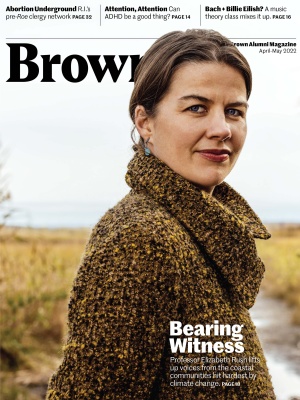First of all, a quick note about paper shortages. The BAM’s January-March issue printed about three weeks later than scheduled as we waited for paper mills to fill our order, and delays in both paper and trucking are still dogging the industry. For this April-May issue, once again, our printer is warning of uncertainty. So although we’re wrapping up this issue at the very beginning of March, it may not reach you on time in early April, and it may end up printed on different paper—whatever we can find. These delays lengthen the already long time between when we prepare the stories in each issue and when you can read them in print—which, we hear from many readers of all ages, is still their preferred medium. But as ever, you can also find the BAM online, on time, as well as on social
media and in your email inbox.
Given these print delays, we strive to bring you stories that offer perspectives on topical issues, rather than straight news that may quickly become outdated. So it is with our two stories around abortion, as the nation waits to see whether the Supreme Court will overturn Roe v. Wade this year. In one, Gillian Frank ’03 AM, ’09 PhD, a historian of religion and sexuality and cohost of the podcast Sexing History, unearths the little-known history of a national network, run by clergy, that helped women obtain abortions before Roe—including on College Hill. We wanted to give this story context, so it’s accompanied by a history of abortion-rights activism at Brown. The University archives don’t contain much information on anti-abortion activism, but if readers have stories to share, we’d welcome letters about their own activism while on campus.
And then there’s our story on Elizabeth Rush, the English professor and former newspaper reporter on this issue’s cover. Her beautifully written, devastating book Rising: Dispatches from the New American Shore captures the stories of people living in vulnerable coastal communities around the country. I live near the ocean, but before reading her book I had never heard the term “raise or raze”—although it refers to a conundrum countless property owners in Rhode Island, and many, many other places around the world, have already faced. If storms and floods threaten your home, do you raise it, attempting to proof it against further destruction, at least for a while—or do you abandon the site? The solutions people find will owe as much to class differences as to philosophical ones and, as Rush notes, sea level rise is likely to only deepen the inequality this country already faces. It’s a deeply felt, rigorously reported, lyrical exploration of this and other issues surrounding climate change that was short-listed for the Pulitzer, and no surprise—it should be required reading for anyone whose decisions may affect the climate, which is to say, all of us. It was published in 2018 but only becomes more urgently relevant every year. On February 15, the National Oceanic and Atmospheric Administration forecast as much sea level rise by 2050 as the United States witnessed in the previous hundred years: another 10 to 12 inches. A further foot is on tap by 2100, almost certainly unstoppable. What we do now will determine if more follows.




